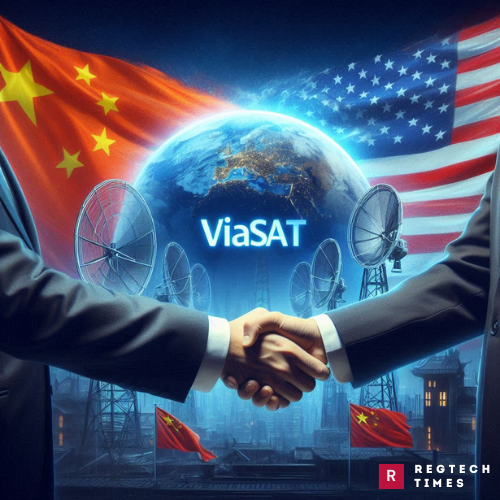In a surprising turn of events, China announced the removal of sanctions on Viasat Inc., a major US communications company, marking a rare reversal in its punitive measures. This decision comes amidst a backdrop of heightened tensions between China and the United States, especially concerning Taiwan. The move, disclosed by Chinese Foreign Ministry spokeswoman Mao Ning during a regular press briefing in Beijing, hints at changing dynamics and potential shifts in Sino-American relations.
Background: Sanctions and Geopolitical Tensions
Earlier this year, China imposed sanctions on Viasat Inc. and four other US defense firms. These measures were a direct response to the US State Department’s approval of an estimated $300 million in potential weapons sales to Taiwan. China, which considers Taiwan a breakaway province to be reunified with the mainland, vehemently opposes any form of military support to the island from foreign nations, particularly the United States.
The sanctions targeted Viasat by freezing its assets in China and prohibiting Chinese entities from conducting transactions or collaborations with the firm. This move aimed to cripple the operations of US defense companies within the Chinese market, exerting economic pressure as part of broader geopolitical strategies.
Viasat’s Operations and Strategic Partnerships
Viasat’s involvement in China is extensive. The company owns several subsidiaries, including a local branch of Inmarsat, a British satellite services provider acquired by Viasat in 2023. Inmarsat garnered international recognition for using satellite data to trace the possible route of Malaysia Airlines flight 370 after its disappearance, showcasing its technological prowess.
China Sanctions Ex-US Legislator Mike Gallagher who Exposed Dangerous CCP Plot in 2024
Before its acquisition by Viasat, Inmarsat had significant dealings in China. One of its notable clients was China Central Television, the state broadcaster investing heavily in global video transmission. Additionally, Viasat had formed partnerships with Chinese firms like China Satellite Communications Co. to provide inflight WiFi services to airlines, highlighting its integration into the Chinese market. In 2022, Viasat further cemented its presence by agreeing to supply equipment to Sichuan Airlines.
The Reversal: A Diplomatic Gesture?
The announcement to lift the sanctions on Viasat signals a rare diplomatic gesture from China. While Mao Ning stated that “the situation had changed” since the sanctions were imposed, she did not elaborate on the specifics. However, this development can be interpreted through multiple lenses.
First, it may indicate a strategic recalibration by China, aiming to de-escalate economic tensions with the United States. The initial sanctions were a form of protest against US military support for Taiwan. By lifting these sanctions, China could be attempting to open a window for dialogue and reduce friction in its economic engagements with the US.
Economic Considerations and Mutual Benefits
China’s decision also reflects the economic interdependencies between the two nations. Despite political tensions, the economic ties between the US and China remain significant. Viasat’s technological contributions, particularly in satellite communications and inflight connectivity, are valuable to China. By allowing Viasat to operate without restrictions, China stands to benefit from advanced technologies and services that support its own economic and technological ambitions.
Japanese Sanctions on Chinese Firms; China Condemns and Retaliates Against Lockheed Martin
Moreover, this move could be seen as part of China’s broader strategy to maintain a balance between asserting its geopolitical interests and fostering economic growth. Engaging with companies like Viasat helps China stay at the forefront of technological innovation, which is crucial for its economic development.
Broader Implications
The lifting of sanctions on Viasat may have broader implications for US-China relations. It suggests a nuanced approach by China, which might be exploring ways to manage its international relations more flexibly. This gesture could serve as a precursor to further diplomatic engagements, aiming to stabilize the complex and often contentious relationship between the world’s two largest economies.
China Retaliates: Imposes Sanctions on Lockheed Martin and other US Defense Companies
China’s decision to drop sanctions on Viasat Inc. marks a significant shift in its approach to dealing with US companies amid geopolitical tensions. This rare reversal highlights the intricate balance China seeks to maintain between its political objectives and economic interests. As the situation evolves, it will be crucial to monitor how this decision influences broader US-China relations and the global geopolitical landscape.


